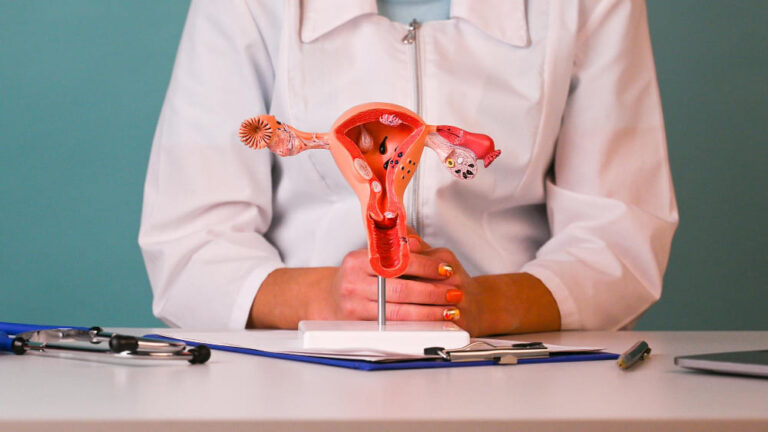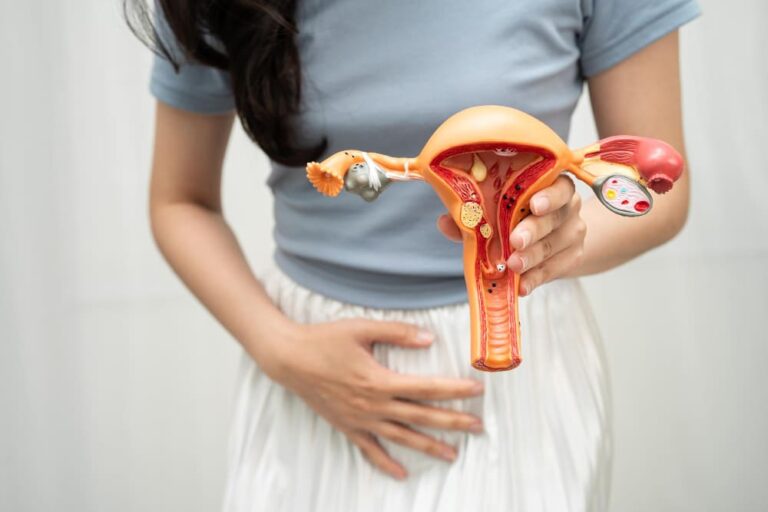Heavy, painful periods can disrupt your life, leading to many health questions. For many women asking about if can adenomyosis cause cancer, it’s time to understand the real facts. Let’s explore the connection.

What Is Adenomyosis, Really?
Before we dive into the cancer connection, it’s important to understand the condition itself. Adenomyosis is a benign (non-cancerous) condition of the uterus. It is characterized by the abnormal presence of endometrial tissue—the very tissue that lines the uterus—growing into the muscular wall of the uterus.
Think of it this way: the endometrial glands and stroma are supposed to stay within the uterine cavity. In adenomyosis, they migrate into the muscle, a place they don’t belong. This displacement causes the surrounding uterine tissue to thicken and can lead to a range of uncomfortable symptoms. For many women, the experience includes:
- Heavy menstrual bleeding or prolonged periods.
- Severe period pain and cramping.
- Chronic pelvic pain.
- Pain during intercourse.
- An enlarged, tender uterus that can cause a feeling of belly fullness.
Because these symptoms are common, many individuals live with them for years before seeking a diagnosis, often wondering if their condition could lead to something more serious.
Exploring the Link: Adenomyosis and Cancer Risk
Here is the central question many patients have: Can adenomyosis cause cancer? The straightforward answer is that adenomyosis is not cancer. However, the conversation is more complex than a simple yes or no. While the malignant transformation of adenomyosis is considered rare, recent medical research and studies have started to identify a potential link and an increased incidence of certain cancers in women with the condition.
The Cancer Risk is not that adenomyosis itself turns into cancer in most cases. Instead, the connection may be explained by shared risk factors and underlying biological mechanisms. Both adenomyosis and certain types of cancer, particularly endometrial cancer, can be influenced by hormonal factors, like estrogen exposure.
The chronic inflammation caused by adenomyosis might also create an environment where abnormal cell growth is more likely to occur. A published cohort study might explore this connection further, aiming to identify the pathogenic mechanism that could explain this link. The objective for both adenomyosis and endometriosis researchers is to understand this increased risk better. 🤔
Cancers Sometimes Associated with Adenomyosis
While the overall risk is low, it’s helpful to know which types of cancer are discussed in medical literature concerning adenomyosis. Understanding these can help you and your doctor monitor your health effectively.
- Endometrial Cancer: This is the most discussed potential connection. Since adenomyosis involves endometrial tissue, there is a theoretical risk that this misplaced tissue could, in very rare instances, develop cancerous characteristics. The abnormal growth and hormonal environment associated with adenomyosis could increase a person’s risk of developing this type of cancer.
- Ovarian Cancer: Some research points to a link between adenomyosis and an increased risk of ovarian cancer, although this connection is often stronger when endometriosis is also present. The presence of endometriomas (cysts related to endometriosis on the ovaries) can increase this risk.
- Uterine Cancers: Other rare uterine cancers have been noted in case studies arising from areas of adenomyosis, but this is an extremely uncommon event.
It is crucial to remember that having adenomyosis does not mean you will develop cancer. It simply means that your health profile has certain factors that may warrant closer attention and regular check-ups with your doctor. 🩺
Adenomyosis vs. Endometriosis: What’s the Difference?
The terms adenomyosis and endometriosis are often used together, which can be confusing. While they share characteristics, they are distinct conditions.
| Adenomyosis | Endometriosis |
|---|---|
| Endometrial tissue grows into the muscular uterine wall. | Endometrial-like tissue grows outside the uterus. |
| The disease is contained within the uterus. | The disease can affect the ovaries, fallopian tubes, and other pelvic tissues. |
| Often leads to a bulky, enlarged uterus and heavy bleeding. | Often leads to painful periods, infertility, and the formation of scar tissue. |
A person can have both conditions at the same time. The overlap in symptoms and the fact that both conditions are hormonally sensitive is why they are often studied together when researchers examine long-term health risks, including cancer.
Key Symptoms You Shouldn’t Ignore
Whether you have been diagnosed with adenomyosis or just suspect it, there are signs that should prompt a conversation with your health provider. While these are common adenomyosis symptoms, they can also be warning signs of other issues, creating what’s known as adenomyosis cancer symptoms overlap.
Pay close attention to:
- Abnormal Bleeding: This includes unusually heavy periods, bleeding that lasts longer than a week, or bleeding between menstrual cycles.
- Worsening Pain: Pelvic pain that becomes more severe, is constant, or isn’t relieved by typical treatments.
- Pressure and Bloating: A persistent feeling of fullness or pressure in your lower belly that doesn’t go away.
- Unexplained Changes: Significant changes in your bowel or bladder habits or unexplained weight loss.
If you experience these signs, it’s not a reason to panic, but it is a reason to act. Early diagnosis and a clear understanding of your condition are powerful tools. 💪
How Can Adenomyosis Be Treated Today?
For women suffering from severe symptoms of adenomyosis, there are several treatments available. Traditional options have included hormonal therapies to manage symptoms or, in severe cases, surgery such as a hysterectomy to remove the uterus entirely.
However, many women want to avoid major surgery and preserve their uterus. This is where modern, minimally invasive techniques come in. Dr. Samir Abdel Ghaffar specializes in Uterine Artery Embolization (UAE), a cutting-edge procedure that offers significant relief without surgery.
UAE is a non-surgical treatment performed by an interventional radiologist. The procedure works by blocking the blood supply to the areas of adenomyosis within the uterine wall. Without blood, this displaced tissue shrinks and dies, leading to a dramatic reduction in symptoms like heavy bleeding and pain.
The benefits are clear: it’s less invasive, requires a shorter recovery time, and leaves the uterus intact. This is an excellent option for women who want to find relief and get back to their lives quickly. ✨
Take Control of Your Uterine Health
Living with adenomyosis brings up many questions and concerns, especially regarding long-term health and potential cancer risks. The key takeaway is that while adenomyosis is a benign condition, it is associated with a small but increased risk for certain cancers that shouldn’t be ignored.
Being proactive about your health is the most important step you can take. If you are struggling with painful, heavy periods and other symptoms of adenomyosis, you don’t have to suffer in silence. Understanding your options is the first step toward relief.
Dr. Samir Abdel Ghaffar is dedicated to providing advanced, non-surgical treatments like UAE to help women reclaim their quality of life. Take the next step to learn more about your options and find a path to feeling better. 💖



